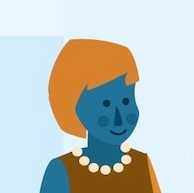This section of our guide on moving to Denmark covers the best schools and higher education institutions in the country for you or your children. In Denmark, you have nothing to worry about when it comes to quality of education—the country has a number of great public and international schools, and some of the best higher education systems in the world. In this guide, get to know the different school levels, hours, and terms in Denmark, as well as how expat children can enroll in public or international schools, what to expect of higher education degrees, and more. We also cover your options of Danish language schools, if you are looking to learn the local language—you should if you want to ensure a successful integration in the country.
Advertisement
Jürgen Hofmeister
The various InterNations activities for expats in Copenhagen made me feel welcome immediately.
Sarah Porter
InterNations expats let me see that there's much more to Copenhagen than clichés like The Little Mermaid and Tivoli...
Jump right in:
Advertisement
Why you'll love InterNations in Denmark
and countless possibilities for fun and friendship!
Advertisement
Advertisement
The Education System in Denmark
The education system in Denmark ranks among the best in the world. Here is an overview of Danish education, including some facts, school ages, passing grades, and more.
Education Facts About Denmark
- Denmark’s education system comprises of both public and private schools. Around 15% of students in basic school attend private schools.
- The public education system is free from primary to higher education.
- Although compulsory education is only up to 16 years of age, more than 80% of students go on to study in the following education levels.
- Private schools take in around 15% of students in Denmark. The vast majority attend public schools or folkeskole.
What is the Education System Like?
Education is divided into the following levels: preschool, primary education, secondary education (which includes lower and upper secondary school), and higher education. Below is a table of the various school levels and corresponding ages in Denmark.
| School level | Grade | Age |
Kindergarten | 1-5 | |
Preschool | 6 | |
Primary and lower secondary | 1-9 | 7-15 |
10th Grade (Efterskole) | 10 | 16 |
Upper secondary | 10-12 | 16-19 |
Higher education | 19+ |
The Danish Grading System
Danish schools use a seven-point scale grading system.
| Grade | Description |
12 | Excellent performance |
10 | Very good performance |
7 | good performance |
4 | Fair performance |
02 | Adequate performance |
00 | Inadequate performance |
-3 | Unacceptable performance |
The minimum passing grade is two. In some cases, only two grades may be given: pass and fail.
School Hours and Terms
The school year in Denmark must make up 200 days of the year. It usually starts in August and ends in June, but different schools may start their terms on different dates. It is best to check the websites of the schools you would like to apply to and find out their application dates and requirements. Schools tend to work 30 to 35 hours a week. Each school can define their own hours, but most run from 8:00 to 15:00.
Main Differences Between Public and Private Schools
If you are already living in Denmark the year your child turns six, and you have not chosen a specific school, your municipality will automatically assign your child a public school or folkeskole. Make sure to contact your preferred school in advance to know all the requirements and whether there is a waiting list. One of the most important requirements for enrollment in school is for your child to have a CPR number (personal identification number).
Private schools in Denmark tend to be smaller than municipal schools. These can be small independent schools in rural areas (friskoler), larger independent schools in urban areas (privatskoler), progressive free schools, etc. Private schools may have waiting lists as well, especially in or around Copenhagen. Private upper secondary schools teach the same type of curricula as public schools, since this education level is mainly focused on preparation for the final exams which lead to university.
What if You Arrive in the Middle of the School Year?
If you arrive in the middle of the school year, a school coordinator may need to assess your child’s needs and language skills. This will result in your child either being enrolled straight into Danish public school classes or placed in a reception class where they will be introduced to the Danish language and school system.


Daycare and Kindergarten
Neither kindergarten nor daycare is mandatory in Denmark, but preschool is. The majority of childcare institutions are municipal and only one fourth are private. Even though there are waiting lists for public centers, these tend to guarantee a place for children from the age of one.
Childcare Options in Denmark
There are various types of childcare centers in Denmark:
- nurseries or Vuggestuer from six months to three years of age
- kindergarten or Børnehaver from three to six years of age
- Aldersintegrerede Institutioner, an encompassing preschool institution for children from six months to six years
- after-school daycare centers for children between the ages of six and ten
Most childcare centers are open Monday through Friday from 6:30 to 17:00 with the exception of Fridays when most close an hour early at 16:00. You can choose full-time childcare which is usually around 40 to 48 hours a week, or part-time care which is between 28 and 32 hours weekly.
Nurseries or Vuggestuer
These day centers look after children from birth or typically from six months of age. These can take in anywhere from 30 to 60 children.
Family daycares are also an option. These are small, private daycare services for a small group of children (four or five) looked after by a nanny in his or her own home.
Kindergarten or Børnehaver
Kindergarten starts at the age of three and ends when the child is old enough to begin preschool which is around five or six.
Even though staff in these day centers are trained professionals, the educational approach is informal. Children learn and develop social, linguistic, physical, and other skills through play rather than in a classroom format.
School Costs
Daycare and kindergarten fees vary by municipality, age of the child, and type of childcare. Municipal centers are mostly financed by the state but parents still copay around 30% of the costs.
The table below lists the average costs:
| Childcare | Price DKK | Price USD |
Daycare, full-time | 3,000 | 445 |
Daycare, part-time | 2,300 | 340 |
Kindergarten, full-time | 2,000 | 295 |
Kindergarten, part-time | 1,150 | 170 |
Food arrangements can add an additional 400 DKK (60 USD) to these costs.
For after-school childcare, you might pay around 1,100 DKK (160 USD) a month for your child to attend afternoons. There are also options for full-time care or for mornings only.


Primary and Secondary Schools
Learn all about sending your kids to folkeskole. We cover the best primary and secondary schools in Denmark, so you know where to find the best quality education for your children.
Folkeskole (Primary and Lower Secondary School)
Folkeskole refers to the free, public school system in Denmark. It comprises primary and lower secondary education. These are the compulsory school levels in Denmark, from ages six to 16, the equivalent of elementary school and part of secondary school in the US.
Folkeskole is also the term for municipal schools but children can attend private schools or be homeschooled as well. If attending a public school, families are free to choose from any municipal school of their preference.
The first year of folkeskole, which is when the child turns six, is referred to as preschool. This is followed by nine more years of compulsory education (primary and lower secondary) and an optional school year corresponding to 10th grade.
Efterskole: Optional 10th Grade
Attending this grade is optional but it can be recommended by the school. Students use this year as an opportunity to improve their grades or to decide on their next course of studies. Most students do attend this grade level.
Gymnasium (Upper Secondary School or High School)
Once children complete folkeskole, they can continue their education at the upper secondary level. This school level typically corresponds to ages 16 to 19 and is not mandatory. However, to access university, they should complete these years of education.
Students can choose from two types of programs:
- General education or _gymnasium—_qualifies students to access higher education
- Vocational or technical education—prepares students for the labor market
Children who wish to study at university should choose one of four education programs. These go by specific (an unintelligible) terms—hf, stx, hhx, and htx.
- hf focuses on natural or social sciences (this has a duration of two years)
- stx is a broad education program, which covers diverse subjects
- hhx focuses on business and economics
- htx focuses on exact sciences
If students completed ten years of basic education, they may only study two more years in upper secondary level known as hf. If they have studied nine years in basic school, their upper secondary level should last three years—stx, hhx, and htx.
Best Schools in Denmark
Here are five of the best schools in Denmark for basic education:
- Endrup School in Fredensborg
- Tranegård School in Gentofte
- Dronninggård School in Rudersdal
- Hareskov School in Fureso
- The Classical Graduate School in Copenhagen
School Costs
If you attend folkeskole, your child’s education is free. If you opt for a private school instead, you can pay as much as 1,000 or 2,000 DKK (150 or 300 USD) a month, depending on the school.


International Schools
In this section, you will find out which are the best international schools in Denmark by curriculum or language. Denmark has 24 international schools in total, most of which are located in the Copenhagen area. These schools teach from basic education, corresponding to the years of compulsory education, to upper secondary education. They can take in children as young as three. Read on for a list of some of the best schools in Denmark for international students.
Public International Schools
Most international schools around the world are private, but in Denmark you can find both public and private schools following an international curriculum. State international schools are run by municipalities and may teach several education levels, from basic to upper secondary. Just like regular public schools, attending a public international school is entirely free. See this list of both public and private schools teaching the International Baccalaureate at the upper secondary level.
If international students cannot be placed in a municipal international school, they will have a vacancy at a regular public school or folkeskole. In this case, however, it would be preferable to apply for a private international school, which is better equipped to meet international students’ needs. One of the most prestigious municipal schools in the country is the European School, or Europaskolen, in Copenhagen.
International School Requirements and Admission
Most schools list their requirements on their website, so you should start there if you already know which schools you are going to apply to.
In general, you will need:
- child’s ID;
- child’s CPR number;
- vaccination records;
- school transfers from previous school years, if applicable;
- language tests of the school’s primary language, if applicable.
Some schools may require an interview with the student.
International School Tuition Fees
Annual tuition fees for international schools start at 20,000 DKK (3,000 USD), but can go as high as 100,000 DKK (15,000 USD). To have reduced tuition fees at private schools, make sure your kid has a CPR number and is registered in school before September 5th.
British or American Schools
Schools teaching entirely in English make up the majority of international schools in Denmark. Some are entirely international schools, while others have only a division of the school dedicated to teaching international children. These may follow the International Baccalaureate, the International Primary Curriculum (IPC), or other internationally recognized accreditation. All international schools must include at least two hours of Danish as part of their curriculum, however many schools choose to teach more. The following schools are some of the top international institutions in Denmark:
- Bjørns International School (BIS), in Copenhagen
- Copenhagen International School (CIS), in Copenhagen
- Aarhus Academy for Global Education, AAGE, in Aarhus
- Skipper Clement School, Aalborg
- Rygaards School, in Hellerup
German Schools
As a neighboring country, you will not have difficulty finding German schools in Denmark, even if only one is listed as an international school in the website of the Ministry of Education—Sankt Petri Schule in Copenhagen. Some German schools in Denmark are bilingual schools, teaching both German and Danish and providing leaving certificates for both. Others follow a German curriculum entirely such as the DSSV (Deutschen Schul-und Sprachvereins für Nordschleswig).
French Schools
According to the Ministry of Education, there is only one school in Denmark teaching entirely in French and following a French curriculum: the Lycée Français Prins Henriks skole, in Copenhagen. As for catholic schools in Denmark, you will find the Rygaards International School in the Copenhagen area and the Institut Sankt Joseph Copenhagen.
Higher Education
Find out which are the best universities in Denmark, whether you are looking for school options for your children, or planning on studying in the country yourself.
There are five types of higher education institutions in Denmark:
- universities
- university colleges (for academy profession degrees and professional bachelor’s degrees)
- artistic higher education institutions
- schools of maritime education and training
- business academies
Best Universities for International Students
Denmark takes fifth place in a ranking of the best higher education systems against fifty other countries worldwide. There are over 600 courses taught in English in Danish universities which means plenty of options for international students. These include courses on communication, computer science, design, technology, tourism and hospitality, marketing, and multimedia.
Top Universities in Denmark
- University of Copenhagen
- Technical University of Denmark (DTU)
- Aarhus University
- Aalborg University
- Copenhagen Business School (CBS)
Undergraduate Degrees
Academy Profession (AP) Degree
AP degrees are specific university degrees focusing on applied learning and developing professional skills. Besides attending standard university lectures, students also collaborate with businesses and industries, and develop a final project for evaluation. These degrees take two or two and a half years to complete and accredit students with 120 ECTs (European Credit Transfer and Accumulation System). This degree is not equivalent to a bachelor’s level. However, they can correspond to a bachelor’s degree if students take an additional one-and-a-half years of study known as top-up degrees.
Bachelor’s Degrees
There are two types of bachelor’s degrees you can obtain in Denmark: a university bachelor’s degree and a professional bachelor’s degree. The first is the common three-year undergraduate program of 180 ECTs which follows the traditional academic format. These focus on one to two subjects, are mostly research and theory based, and take three years to complete.
The professional bachelor’s degree is geared towards entering the job market. You obtain this degree after completing an AP program with a top-up degree as explained above. This offers both theoretical and practical knowledge, as well as offering students the opportunity to be placed in the job market for first-hand professional experience. You can find this type of degree at University colleges or Professionshøjskoler and most of these programs give access to postgraduate studies as well.
Postgraduate Degrees
Postgraduate studies in Denmark correspond to a Candidatus or master’s degree. These are mostly research-based courses, typically of two years, at the end of which you submit a dissertation or a practical project. You can join the job market after completing a master’s degree or undertake further studies with a PhD degree.
How Much does it Cost to Study in Denmark for International Students?
Studying at university in Denmark should be entirely free if you are a resident, either temporary or permanent, or a student of the EU, EEA, and Switzerland.
For other students, tuition fees can start at 44,000 DKK (6,500 USD) and go up to 120,000 DKK (18,000 USD) annually.
There are grants and scholarships you can apply for such as the SU, the Danish students’ Grants and Loans Scheme, or the State Educational Support for Adults (SVU), for those already in the workforce who wish to supplement their education.
Language Schools
A number of language schools offer Danish classes for expats in Denmark. Learning the local language can be the deciding factor of a relocation so do not overlook this step. Local municipalities offer Danish language programs to foreigners living in Denmark. These must be over 18 and have a CPR number. You should receive a referral letter from your municipality, after which you have 30 days to register within the local language center. You can choose from a number of public and private schools approved by the Ministry of Education.
Language School Costs
Language schools fees for municipal classes are 2,000 DKK (300 USD) per model. You would need to pay a 1,250 DKK (185 USD) deposit to secure a place in class, which is returned to you. You can also opt for one of the many private language schools which also offer classes for different language skills, from beginner to intermediate and advanced. Keep in mind these courses may cost more.
Other Ways to Learn Danish
You can also learn Danish in language through online courses. There are several free online courses you can take, usually more suitable for beginners. There are also a number of language exchange clubs and cafés you can join where you meet other expats or locals with whom you can practice the language.
Advertisement
Our Global Partners
Communities in Denmark
Like-Minded Expatriates in Denmark
Denmark Guide Topics
Advertisement




